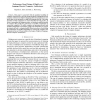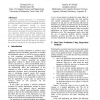423 search results - page 8 / 85 » Predicting Queue Times on Space-Sharing Parallel Computers |
TSMC
1998
13 years 7 months ago
1998
— This paper is concerned with the analytical modeling of computer architectures to aid in the design of high-level language-directed computer architectures. High-level language-...
HPCA
2004
IEEE
14 years 7 months ago
2004
IEEE
Design of wakeup-free issue queues is becoming desirable due to the increasing complexity associated with broadcast-based instruction wakeup. The effectiveness of most wakeup-free...
COR
2008
13 years 7 months ago
2008
-- The optimal buffer allocation in queueing network systems is a difficult stochastic, non-linear, integer mathematical programming problem. Moreover, the objective function, the ...
CLUSTER
2003
IEEE
14 years 21 days ago
2003
IEEE
Application run-time information is a fundamental component in application and job scheduling. However, accurate predictions of run times are difficult to achieve for parallel app...
PPOPP
2012
ACM
12 years 2 months ago
2012
ACM
Lock-freedom is a progress guarantee that ensures overall program progress. Wait-freedom is a stronger progress guarantee that ensures the progress of each thread in the program. ...


